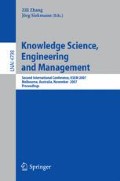Abstract
In this paper, we present a new framework of fuzzy constraint logic programming language including negation as failure which is a combination of fuzzy logic and fuzzy relation. We give the answer set semantics which is based on the method of stable model. Although much work have been done for answer set programming, no work addressed the answer set semantics for fuzzy constraint logic programming with negation as failure. Also, we give an example to illustrate the idea. Compared to Zadeh’s compositional rule of inference for approximate reasoning used in [9], we find an effective and efficient computational procedure for fuzzy constraint logic programming by using answer set semantics.
Access this chapter
Tax calculation will be finalised at checkout
Purchases are for personal use only
Preview
Unable to display preview. Download preview PDF.
References
Apt, K.R.: Logic programming, Handbook of Theoretical Computer Science, Ch. 10, vol. B, pp. 493–574. MIT Press, Cambridge (1990)
Dubois, D., Fargier, H., Prade, H.: Propagation and satisfaction of flexible constraints. In: Yager, R., Zadeh, L. (eds.) Fuzzy sets, Neural Networds and Soft Computing, pp. 166–187. Van Nostrand Reinhold, New York (1994)
Gelfond, M., Lifschitz, V.: The stable model semantics for logic programming. In: Logic programming: Proc. of the Fifthe int. Conf. and Symp., pp. 1070–1080 (1988)
Gelfond, M., Lifschitz, V.: Classical negation in logic programs and disjunctive databases. New generation computing, pp. 579–597 (1990)
Joxan, J., Michael, J.M.: Constraint Logic Programming: A Survey. Journal of Logic Programming (1994)
Klir, G.J., Yuan, B.: Fuzzy Sets and Fuzzy Logic: Theory and applications. Prentice-Hall, Englewood Cliffs, NJ (1995)
Kowalski, R.A.: Predicated logic as a programming language. In: Information processing 1974, pp. 569–574 (1974)
Lai, U.J., Hwang, C.L.: Fuzzy Mathematical Programming: Methods and Applications. In: Lecture Notes in Economics and Mathematical Systems, Springer, Heidelberg (1992)
Lim, H.: Fuzzy Constraint Logic Programming, Fuzzy Systems. In: International Joint Conference of the Fourth IEEE International Conference on Fuzzy Systems, vol. 4, pp. 20–24 (1995)
Lloyd, J.: Foundations of logic programming. Springer, Heidelberg (1984)
Luo, X., Jennings, N.R., Shadbolt, N., Leung, H.F., Lee, J.H.M.: A fuzzy constraint based model for bilateral, multi-issue negotiation in semi-competitive environments. Artificial Intelligence 148(1-2), 53–102 (2003)
Luo, X., Lee, J.H.M., Leung, H.F., Jennings, N.R.: Prioritised Fuzzy Constraint Satisfaction Problems: Axioms, Instantiation and Validation. Fuzzy Sets and Systems 136(2), 155–188 (2003)
Luo, X., Zhang, C., Jennings, N.R.: A hybrid model for sharing information between fuzzy, uncertain and default reasoning models in multi-agent systems. International Journal of Uncertainty, Fuzziness and Knowledge-Based Systems 10(4), 401–450 (2002)
Machworth, A.K.: Consistency in networks of relations. Artificial Intelligence 8(1), 99–118 (1977)
Mukaidono, M., Kikuchi, H.: Foundations of fuzzy logic programming. In: Wang, P.Z, Loe, K.F. (eds.) Between mind and computer, pp. 225–244. World Scientific, Singapore (1993)
Tsang, E.P.K.: Foundations of constraint Satisfaction. Academic Press, New York (1993)
Wang, J., Liu, C.: Agent Oriented Probabilistic Logic Programming with Fuzzy Constraints. In: Shi, Z.-Z., Sadananda, R. (eds.) PRIMA 2006. LNCS (LNAI), vol. 4088, pp. 664–672. Springer, Heidelberg (2006)
Zadeh, L.A.: Fuzzy Sets. Inform. and Control 8, 338–353 (1965)
Author information
Authors and Affiliations
Editor information
Rights and permissions
Copyright information
© 2007 Springer-Verlag Berlin Heidelberg
About this paper
Cite this paper
Wang, J., Liu, C. (2007). Fuzzy Constraint Logic Programming with Answer Set Semantics. In: Zhang, Z., Siekmann, J. (eds) Knowledge Science, Engineering and Management. KSEM 2007. Lecture Notes in Computer Science(), vol 4798. Springer, Berlin, Heidelberg. https://doi.org/10.1007/978-3-540-76719-0_9
Download citation
DOI: https://doi.org/10.1007/978-3-540-76719-0_9
Publisher Name: Springer, Berlin, Heidelberg
Print ISBN: 978-3-540-76718-3
Online ISBN: 978-3-540-76719-0
eBook Packages: Computer ScienceComputer Science (R0)

